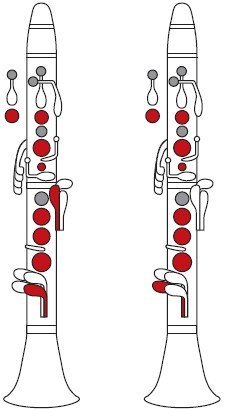When you're learning to play the clarinet, one scale that often gets overlooked is the Eb Minor Scale (Natural). But don't let that fool ya! This scale has got a rich history and has significantly shaped the way musicians express themselves over the centuries.

Clarinet Fingering Charts are always FREE at MartinFreres.net!
The Emotional Roots of Eb Minor
The Eb Minor Scale has some deep emotional roots. Composers from Beethoven to Brahms have used this haunting scale to add drama to their works. It's as if the pentatonic notes carry emotions – sadness, longing, and sometimes even hope.
Skilled clarinetists have also embraced Eb Minor. This scale pushes the clarinet to its limits, overcoming historical challenges. From basic fingerings to complex solos and orchestral pieces, players explore a range of expressive notes.
The Structure of Eb Minor Scale
Here's a fun fact: the Eb Minor Scale consists of Eb, F, Gb, Ab, Bb, Cb, and Db. These flat notes create a dark, rich sound that both beginners and pros appreciate. Next time you practice, think about how these notes shape your emotional expression. Each play gives you a chance to explore the feelings they stir up.
| Note | Emotional Association |
|---|---|
| Eb | Melancholy |
| F | Tension |
| Gb | Mystery |
| Ab | Longing |
| Bb | Reflection |
| Cb | Uncertainty |
| Db | Resolution |
Challenges and Skills Development
The Eb Minor Scale offers unique challenges, like balancing high notes and finger speed. But these challenges help clarinetists grow. By mastering this scale, you'll improve your technique and overall musical ability. You'll gain a deeper understanding of music theory, changing how you interpret both old and new compositions.
The Historical Significance of Eb Minor
The Eb Minor Scale's importance goes beyond its sound. Throughout music history, it's been a tool for expressing human emotions. From classical pieces to jazz improvisations, this scale has brought soul to countless compositions.
“The Eb Minor Scale isn't just notes on a page; it's a journey through musical history, carrying the emotions of generations.”
Eb Minor in Modern Context
Think about how this scale fits into your playing style. Do you like pieces with a wide emotional range? If so, the Eb Minor Scale should be part of your practice routine. It's more than just a scale; it's a link to music's past and a valuable tool for today's clarinetists.
Enhancing Your Clarinet Skills
To boost your clarinet skills, focus on the Eb Minor Scale. Remember, it's not just about playing notes; it's about telling stories through music. As you explore this scale, keep the Martin Freres tradition in mind. Their dedication to quality craftsmanship shines through in every note, showing how great instruments can elevate your musical expression.
Conclusion
The next time scales come up in your clarinet lessons, don't forget about Eb Minor. It's more than just another scale; it's a key part of clarinet history that has inspired countless artists. Give it a try, experiment with it, and let it sweep you away, just like it did for the great composers of the past!
Table of Contents
- The Emotional Roots of Eb Minor
- The Structure of Eb Minor Scale
- Challenges and Skills Development
- The Historical Significance of Eb Minor
- Eb Minor in Modern Context
- Enhancing Your Clarinet Skills
- Conclusion








